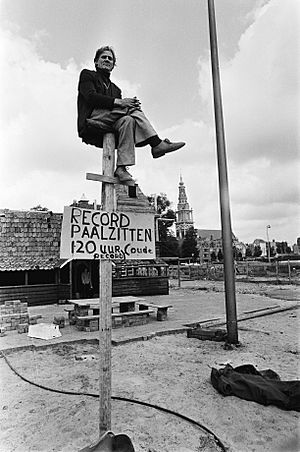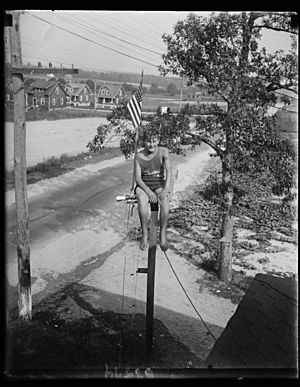Pole-sitting facts for kids
Pole sitting is a unique challenge. It involves sitting on top of a tall pole, like a flagpole, for a very long time. People do this to test how long they can endure. Usually, a small platform is built at the top for the person to sit on. This unusual activity became very popular in the 1920s. A stunt actor named Alvin "Shipwreck" Kelly helped start this trend. However, it mostly ended when the Great Depression began.
The History of Pole Sitting
Pole sitting has a long history. It goes back to an ancient practice called stylitism, or column-sitting. This was a type of ascetic discipline. Asceticism means living a very simple life, often to show devotion or self-control.
One famous column-sitter was Saint Simeon Stylites the Elder. He lived around 388 to 459 AD. He was from Antioch, which is now in Turkey. Saint Simeon sat on a small platform on top of a column for an amazing 36 years!
The 1920s Fad: Flagpole Sitting
Flagpole sitting became a huge trend in the mid-to-late 1920s. This fad was started by a stunt actor and former sailor named Alvin "Shipwreck" Kelly. He first sat on a flagpole in 1924. Some say it was a dare from a friend. Others believe it was a way to get attention.
Shipwreck's first sit lasted 13 hours and 13 minutes. Soon, other people started trying to break his record. Contestants set new records of 12, 17, and even 21 days.
Breaking Records
In 1929, Shipwreck Kelly decided to get his title back. He sat on a flagpole for 49 days in Atlantic City, New Jersey. This set a brand new record!
However, his record didn't last long. In 1930, Bill Penfield broke it in Strawberry Point, Iowa. Bill sat on a flagpole for 51 days and 20 hours. He only came down because a big thunderstorm forced him to.
For the most part, pole sitting was popular only in the 1920s. The fad ended when the Great Depression began.



